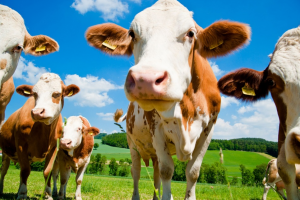What is your opinion on human cloning? Have you ever thought about having another identical self? Not only the surface but genetically identical? To certain extent, many would feel leery even thinking about it.
Then what are your opinions on animal cloning of animals? Unlike human cloning, there seems to be distinct split opinions between different countries. Some countries suggest a positive perspective toward the idea of cloning animals for meat productions. In 2008, FDA has ultimately concluded that meat from cloned animals and offspring of clones are safe to be consumed by consumers. They added that it is as safe as those foods from conventionally bred animals. Since then, products of cloned animals, which include cow, goat and pig, are allowed to be sold in the market without any labelling that differentiate cloned animals from conventionally bred ones.
How did this issue on cloned animals arise in the first place?
The history of cloning started with a female domestic sheep named Dolly in Scotland in 1996. Cloning of animals is a technique that involves use of adult somatic cell by replacing the nucleus of unfertilized ovum to nucleus of the somatic cell and produces an embryo. After its first introduction from Scotland, cloning of animals has been studied and practiced ever since.
Ironically, in 8th of September 2015, the European Parliament voted to ban animal cloning completely including all farm animals, their descendants, and products derived from them that include imported products into the Europe. With issues regarding animal welfare and ethical considerations, the European Parliament has decided to fully ban the practice of cloning animals. In addition, despite FDA’s claim that cloned animals are safe to consume by human, there are several concerns associated with consumption of cloned animals. Cloned animals tend to have problem delivering live young and produce lameness and in order to overcome this issue, they are treated with hormones and antibiotics. With consumption of these heavily dosed cloned animals, number of health risk may arise such as allergenicity, development of antimicrobial resistant microbes, toxicity, carcinogenicity and much more. To add to this notion, European Food Safety Authority has stated that there are still uncertainties in the risk from the lack of studies and evidence available for information on safety of cloned animals except cattles and pigs.
Wi th two very different opinions toward consumption of animals from North America and Europe, it is hard to choose which studies are true. The controversy of having cloned animals for meat production and other consumption is still unresolved as no one possess enough evidence to fully back up their opinions.
th two very different opinions toward consumption of animals from North America and Europe, it is hard to choose which studies are true. The controversy of having cloned animals for meat production and other consumption is still unresolved as no one possess enough evidence to fully back up their opinions.
How do you feel about animal cloning now? Did this persuade to change your mind to be against cloned animals or not?
Let me know on the comments below!
Reference
Main article for this blog: E.U parliament votes to ban cloning of farm animals.. Retrieved on Nov 25th, 2015 from http://news.sciencemag.org/europe/2015/09/e-u-parliament-votes-ban-cloning-farm-animals
Are We Eating Cloned Meat? Retreived on Nov 28th, 2015 from http://www.scientificamerican.com/article/are-we-eating-cloned-meat/
Center for Food Safety. Retrieved on Nov 28th, 2015 from http://www.centerforfoodsafety.org/issues/302/animal-cloning/about-cloned-animals#
European Food Safety Authority. Retrieved on Nov 28th 2015 from http://www.efsa.europa.eu/en/topics/topic/cloning
European Parliament News. Retrieved on Nov 29th, 2015: http://www.europarl.europa.eu/news/en/news-room/content/20150617IPR67269/html/Ban-not-just-animal-cloning-but-cloned-food-feed-and-imports-too-say-MEPs
U.S. Food and Drug Administration. Retrieved on Nov 25th, 2015 from http://www.fda.gov/AnimalVeterinary/SafetyHealth/AnimalCloning/
